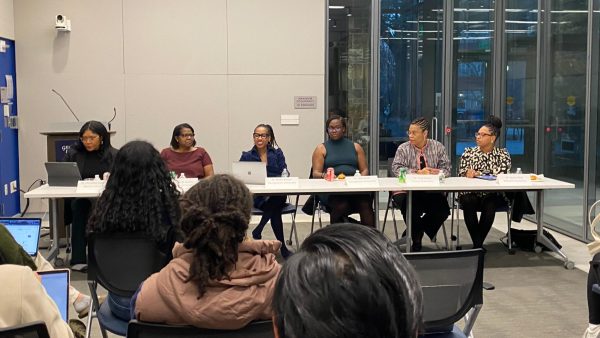Six professors discussed the role of Black women as leaders and mobilizers in voting, their influence in past elections and their role in the upcoming 2024 presidential election in a Feb. 5 panel.
Georgetown University’s government department, department of African American studies and women’s and gender studies (WGST) program co-hosted the panel to highlight Black women’s contributions to political leadership. The panel included several Black female experts in the field, with Nadia Brown, the director of the WGST department and a professor of government at Georgetown, moderating the discussion.
Sharon Austin, a panelist and professor of political science at the University of Florida, said the study of Black women’s role in politics is new and has only been thrust into the mainstream by years of academics’ advocacy.
“I was told when I was an assistant professor trying to get tenure, ‘You won’t get tenure if you publish this, nobody cares about this,’” Austin said at the event. “Back then, it was almost impossible to study Black women.”
“I’m always really excited when I see posts, projects, or see articles or see Black women being employed in political office, and that’s something really significant because your generation might be taking that for granted,” Austin added.

The four other panelists were Christine Slaughter, an assistant professor of political science at Boston University; Pearl Dowe, a professor of political science and African American studies and the vice provost of faculty affairs at Emory University; Jamil Scott, an assistant professor of government at Georgetown; and Ayana Best, an assistant professor of political science at Howard University.
Slaughter said that Black women studying political science hold diverse political views and practices.
“We are very, very diverse in our way of thinking and in our way of being and in our way of coming to understand what politics is and where we fit in,” Slaughter said at the event.
Scott said that inclusive studies of Black women in politics allow people to see the various identities and beliefs beyond what people believe to be a monolithic political identity for the group.
“What is under the surface is this really rich in-group conversation that’s happening around candidacy, that’s happening around politics,” Scott said. “Where people believe the work that my co-panelists are talking about that are revealing the in-group dynamics.”
Best said the variation in the political beliefs of Black women based on demographics and location has shaped her research in understanding the contrasting political views among these communities, such as Black Muslim women in the north compared to southern Black women.
“I’m originally from the West Coast, and moving to the East Coast is seeing so many variations of what I considered to be Black culture and what that meant in different places, I think is important to note,” Best said. “Understanding variation in that way has been informative to my research.”
Austin said that Black women involved in politics and political organizing can shape the political landscape even without winning their elections, referencing Stacey Abrams, a Democratic candidate for governor of Georgia in 2018 and 2022 turned political organizer focusing on voting registration and access.
“Despite the fact that she was defeated in 2018, she turned that negative into a positive because she then started working to mobilize voters,” Austin said. “If it were not for her work and the work of other women, especially of other Black women, Joe Biden definitely wouldn’t have won Georgia in 2020.”
Austin said she believes the future of political research in her field will concentrate on Black women’s governance and policy work in different areas of the United States as more Black women hold political positions in all levels of government.
“It’s still kind of a recent phenomenon to see Black women getting elected to major offices,” Austin said. “I’m expecting to see more about not just how they win, but, once they’re in office, how they govern.”
Slaughter said the perspectives of how Black women relate to different parts of their identity, such as being a mother and experiences with race, represent the need to study their role in American politics.
“All of these experiences really shape and give Black women a unique view that no other demographic has,” Slaughter said. “To really understand American politics and who’s at the margins, but also, the strategies to move beyond the margins.”








